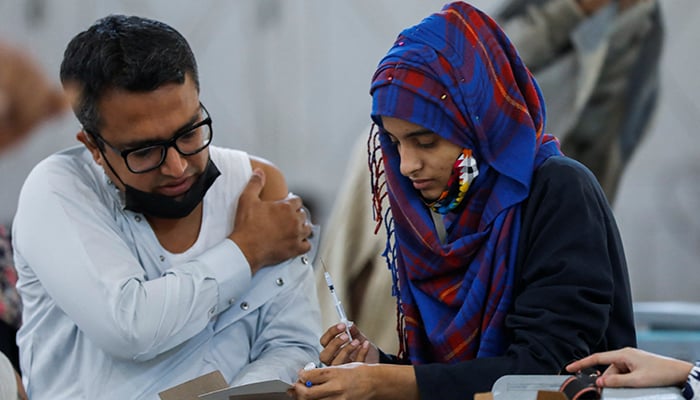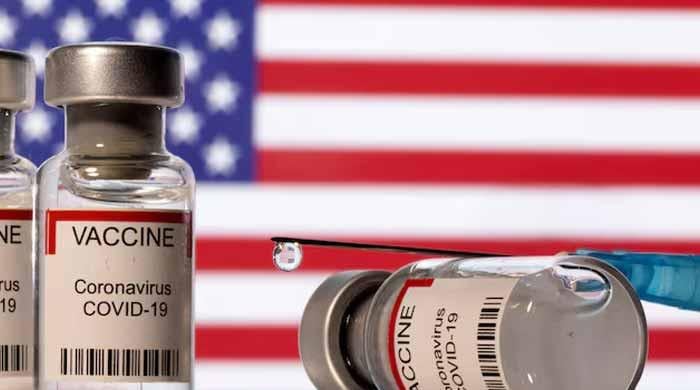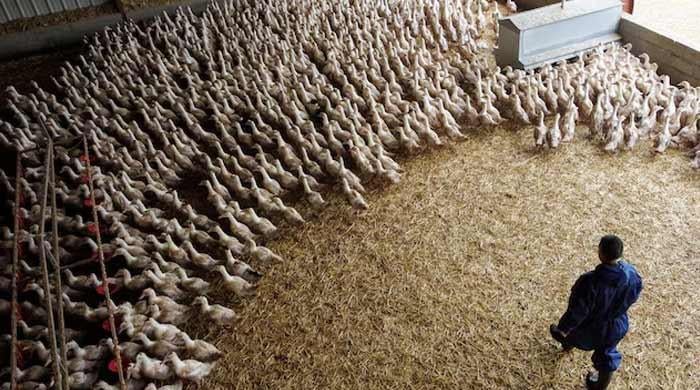Coronavirus in Pakistan: Don’t take Omicron lightly, warns Dr Faisal Sultan
It takes 1-2 weeks for hospitalisations to go up, says the health minister as Omicron cases rise
January 05, 2022

- Hospitalisations to go up in next one to two weeks, Dr Sultan says.
- Dr Sultan warns people against taking Omicron lightly.
- He urges people to wear masks and vaccinate.
KARACHI: Amid a sharp rise in the COVID-19 cases across Pakistan, SAPM on Health Dr Faisal Sultan warned people on Tuesday to not take Omicron “lightly” as hospitalisation will increase in the next one to two weeks.
The country’s top health official advised the public to follow the COVID-19 SOPs and get vaccinated at the earliest.
“It’s still a bit early to draw conclusions since it takes 1-2 weeks for hospitalisations to go up. Also, let us see how the virus behaves regarding virulence”, Dr Sultan said when asked as to why hospitalisations were not going up in Karachi despite an increase in the number of COVID-19 cases due to the spread of the Omicron variant.
Hospitalisations remained negligible and there were hardly any patients under treatment at major public and private health facilities in Karachi despite the fact the COVID-19 positivity touched 8.91% in the city, where 339 more people were tested positive with over 50% people infected with the Omicron variant.
Liaquat National Hospital (LNH) said Tuesday not a single patient of COVID-19 was admitted to their COVID ward on Monday — for the first time in the last 20 months, which shows that the Omicron variant is not as virulent as it is being perceived.
Other hospitals in the city including Ziauddin Hospital, Aga Khan University Hospital (AKUH), Jinnah Postgraduate Medical Center (JPMC), Dow University Ojha campus, and other health facilities said hospitalisation due to coronavirus was still very low despite an increase in and spread of Omicron variant in the city.
Infectious Diseases Hospital and Research Center at NIPA Karachi, which is the only dedicated hospital for COVID-19 patients, said they too were not seeing any increase in the number of patients for quite some time and at the moment, most of their beds were vacant.
“At the moment, we are receiving one or two patients with COVID-19 on daily basis, but so far, we have not found anybody infected with Omicron Variant of the COVID-19”, Dr Abdul Wahid Rajput, Medical Superintendent of the Infectious Diseases Hospital, affiliated with Dow University of Health Sciences (DUHS) told The News.
But SAPM Dr Sultan believes that there will definitely be an increase in hospitalisations after people start getting infected with the Omicron variant and advised people to keep their guard up against COVID-19.
“There will be some increase in hospitalisation. How much, depends on the degree of spread and infection. International evidence suggests it spreads fast; how much serious sickness it causes will be evident in a week or two (for us)”, Dr Sultan added.
“What I would say is this: we should not take it lightly”, he warned.
When asked if the government was worried about the low vaccination rate in major cities, including Karachi and Lahore, he said: “We want it (vaccination) higher for sure. I am happy that the vaccination rates picked up with time but we still have some distance to still go. So I would not say I am worried but that we need to enhance the numbers further.”
“Masks. Masks. Masks. Avoid crowds. Vaccinate. Ventilate,” was his advice to people in Karachi.
Originally published in The News









